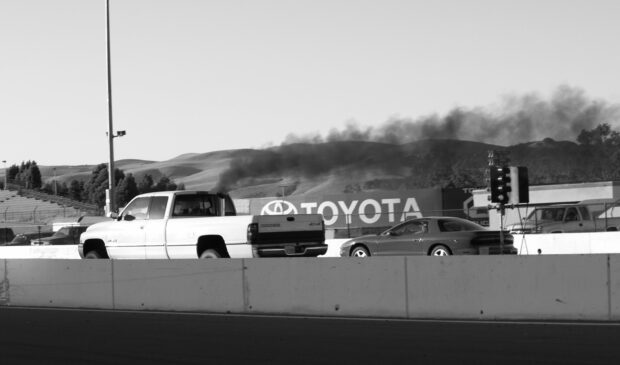Council pushes for pause on I-35 expansion, citing air quality concerns
Friday, October 20, 2023 by
Chad Swiatecki Citing concerns over possible environmental and air quality impacts, City Council wants to delay the start of the reconstruction of Interstate 35.
By a 7-3 vote, Council approved a resolution Thursday that asked the Texas Department of Transportation and Capital Area Metropolitan Planning Organization to hold off on any funding for the $4.5 billion project until a pair of environmental studies – CAMPO’s Regional Mobile Emission Reduction Plan and the Austin MSA Climate Plan – are completed. Mayor Kirk Watson and Council members Leslie Pool and Mackenzie Kelly voted against the resolution, and Council Member Natasha Harper-Madison is away on medical leave.
The resolution followed many of the same concerns and talking points of a recent recommendation by Council’s Mobility Committee. Along with the environmental concerns, that recommendation raised the issue of the city needing to identify by next December a funding source for $450 million to construct caps over several portions of the expressway.
Dozens of people spoke during public comments about the project, with most supporting the resolution and the desire by many to pause the project or reduce its scope.
“(TxDOT) win(s) most of the time, but not all of the time. They won’t bend without real pressure, and y’all need to step up and fight this to the end and at least get some leverage,” attorney and environmental advocate Bill Bunch said. “You all also need to engage with (Transportation) Secretary Buttigieg. Mayor Pete and the Biden administration have said over and over that they understand that these urban highways that were built and destroyed our central cities, divided them racially, had extreme impacts on communities of color, that they need to be mitigating that and reducing it, removing urban highways. And yet here we are, expanding, adding way more harm to the original harm that was done.”
Prior to the meeting, a consortium of civic and business groups organized in support of the project, including Austin Area Research Organization, the Downtown Austin Alliance, the Greater Austin Asian Chamber of Commerce, the Austin Chamber of Commerce, the Greater Austin Hispanic Chamber of Commerce, Opportunity Austin and the Real Estate Council of Austin.
“We need to address transportation deficiencies, retrofit and rebuild existing infrastructure, and the Capital Express Central project aims to do just that,” said Ali Khataw, chair of the Austin Chamber of Commerce. “One important aspect of this project is inclusion of managed lanes, which will support rapid bus services on I-35 and encourage carpooling or vanpooling. This is crucial for achieving the city of Austin goals for remote shift. Moreover, without the improvements offered by east-west stitches and parallel pathways, I-35 will remain unsafe for drivers, pedestrians and cyclists. Failing to execute this project would maintain an unacceptable status quo.”
Kelly said she voted against the resolution because a delay of the project could cause TxDOT and CAMPO to pull its funding in favor of supporting other transportation needs elsewhere in the state. She also said the state’s recently released environmental impact statement projected no substantial air quality or other impacts caused by the expansion.
Council Member Alison Alter, who raised the concerns about the city’s portion of the project cost at last month’s Mobility Committee meeting, questioned TxDOT staffers on why the state’s environmental impact statement on the project didn’t take into account the proposed caps and their possible effects on air quality and green house gases.
“We can recognize that expanding I-35 in particular ways could help with mode shift, which is one of the things that we care about. We also can recognize that our Environmental Impact Statement can’t capture yet other benefits for emissions that will come from fleet electrification or from future vehicle emission standards. There’s a certain amount of art that’s going along with this process,” Alter said, while noting that the city’s nearly $500 million portion for the caps “is a real lot to be asking our community.”
Council Member Chito Vela said with the expansion’s progress almost a certainty, the city needs to do whatever it can to reduce the environmental impacts for residents while adding as many community benefits as possible.
“This project is almost certainly going to happen. I disagree with the fundamental premise of highway expansions, especially through the hearts of cities. Larger and larger highways carrying more and more cars and trucks are not the future. High-quality mass transit and multimodal transportation that promotes walking and biking is the future,” he said. “The project is moving forward and I’m not aware of any legal or political strategy that will stop it. And if that is a reality, we must do everything we can to mitigate the negative effects.”
Photo made available through a Creative Commons license.
The Austin Monitor’s work is made possible by donations from the community. Though our reporting covers donors from time to time, we are careful to keep business and editorial efforts separate while maintaining transparency. A complete list of donors is available here, and our code of ethics is explained here.
You're a community leader
And we’re honored you look to us for serious, in-depth news. You know a strong community needs local and dedicated watchdog reporting. We’re here for you and that won’t change. Now will you take the powerful next step and support our nonprofit news organization?








